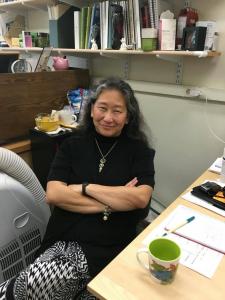Linda Park

Voices from the Science Centers
Voices from the Science Centers is an oral history initiative dedicated to documenting the institutional knowledge of fisheries scientists and administrators in the labs of NOAA’s Fisheries Science Centers.
Linda Park is a research geneticist at the Northwest Fisheries Science Center in Seattle, Washington. She received a Bachelor of Science degree in biological sciences and genetics from Cornell University and a PhD in population biology from Washington University in St. Louis. She has worked for NOAA for 26 years, and is currently the team leader of the molecular genetics laboratory.
Interview contains discussions of:Northwest Fisheries Science Center, environmental DNA, deep ocean organisms, functional genetic mapping, epigenetics genetics, molecular genetics, population biology, NOAA, NMFS, salmon genetics, technology, fieldwork, funding and government agencies.
In this interview, Linda Park discusses her path to becoming a geneticist with NOAA and gives an overview of her career. During her graduate work, she conducted research in one of the first labs to do molecular genetics for population biology. Her first post-doc position was in a Monterey lab studying rockfish. At NOAA, she has helped to establish a new molecular genetics program focused on DNA instead of proteins.
Park describes the incredible pace at which the field of genetics has progressed and how her lab has collaborated with other divisions in the agency. She also remarks on the increase in diversity that she’s seen since initially being hired.
Please Note: The oral histories in this collection are protected by copyright and have been created for educational, research and personal use as described by the Fair Use Doctrine in the U.S. Copyright law. Please reach out Voices@noaa.gov to let us know how these interviews are being used in your research, project, exhibit, etc. The Voices staff can help provide other useful resources related to your inquiry.
The NOAA mission is to understand and predict changes in climate, weather, oceans, and coasts, to share that knowledge and information with others, and to conserve and manage coastal and marine ecosystems and resources. The Voices Oral History Archives offers public access to a wide range of accounts, including historical materials that are products of their particular times, and may contain offensive language or negative stereotypes.
Voices Oral History Archives does not verify the accuracy of materials submitted to us. The opinions expressed in the interviews are those of the interviewee only. The interviews here have been made available to the public only after the interviewer has confirmed that they have obtained consent.
